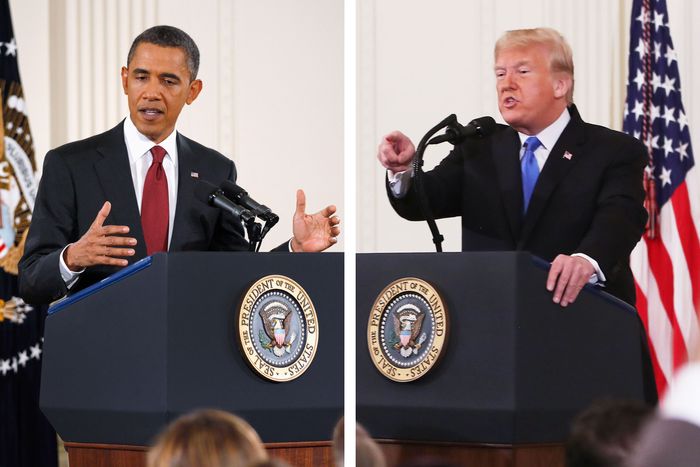
The standard reaction to the way the president has behaved since his party’s midterm setback has been to note accurately that he is Donald Trump acting just like Donald Trump. There’s been no “pivot’ (other than his standard minute-to-minute erratic communications), no effort to project a “New Trump,” and of course, no acceptance of responsibility. To the extent the president has even reflected on the results, it has been to deny it’s a defeat at all (which is ridiculous if predictable), or to blame Republican losers for ensuring their own defeat via insufficient sycophancy toward his own self.
Before moving on to the reality that Trump will probably remain Trump right on through to the 2020 election, it’s worth looking back at how the last president reacted to his own midterm defeat in 2010. For one thing, Obama accepted responsibility for his party’s performance, as the Washington Post reported at the time:
President Obama, appearing somber and reflective after what he described as a “shellacking” at the polls Tuesday night, conceded Wednesday that his connection with Americans has grown “rockier” over the last two years and expressed sadness over the defeats of congressional Democrats who supported him…
In response to a question about how he felt when some of his Democratic friends and supporters in Congress lost their reelection bids, Obama said: “It feels bad. You know, the toughest thing over the last couple of days is seeing really terrific public servants not have the opportunity to serve anymore, at least in the short term.” Not only is he sad to see them go, he said, “but there’s also a lot of questioning on my part in terms of, “could I have done something differently or done something more so that those folks would still be here?’ It’s hard. And I take responsibility for it in a lot of ways. “
And Obama also made immediate and reasonably durable overtures to the opposition in a way that Trump hasn’t done except in the most superficial (“let’s compromise: do it my way!”) manner:
He said he told Senate Minority Leader Mitch McConnell (R-Ky.) and Rep. John A. Boehner (R-Ohio), the new presumptive speaker of the House, that he is “very eager to sit down with members of both parties and figure out how we can move forward together.” He added, “I’m not suggesting this will be easy. I won’t pretend that we’ll be able to bridge every difference or solve every disagreement.”
These Obama gestures led to the long and murky search for a “Grand Bargain” over budget and tax policy, which didn’t produce any breakthrough (Republicans couldn’t bring themselves to support any sort of tax increase, and Democrats wouldn’t buy into “entitlement reform”) but did arguably help Democrats clarify their side of the argument and position Obama for reelection in 2012. It wasn’t as dramatic as what Ronald Reagan did after his party lost ground in 1982; he accepted two tax increases before rolling to a landslide reelection win in 1984. But both of these presidents understood that going along with electoral signals that they had initially overreached made a sort of reset possible which set the foundation for reelection.
If there is any discernible lesson President Trump drew from his midterm defeat (beyond denying it) it seems to be that he and his party did not go far enough in energizing its base by driving so deep a ravine between the two parties that any talk of bipartisanship would be a laughable ruse. So instead of discussing a “Grand Bargain,” Trump has created a situation in which even a no-brainer tiny bargain to keep the federal government operating through the holidays looks very unlikely. To the extent that his strategy (or lack thereof) going forward relies on confrontation rather than actual negotiation, with (presumably) 2020 preelection polls and then the election results determining the “winner” rather than any policy accomplishments, Congress could shut down for much of the next two years and it would not make much difference, now that his party has lost the House. But those voters who hoped they had forced Trump to get a grip on himself in November are going to be very disappointed.






























